 Your new post is loading...
 Your new post is loading...

|
Scooped by
Gust MEES
|

|
Scooped by
Gust MEES
|
Exploit erlaubt böswilligen Zugriff trotz Passwort-Reset
Durch eine Schwachstelle in einem OAuth-Endpunkt können sich Cyberkriminelle dauerhaft Zugriff auf das Google-Konto einer Zielperson verschaffen. Learn more / En savoir plus / Mehr erfahren: https://www.scoop.it/topic/securite-pc-et-internet

|
Scooped by
Gust MEES
|

|
Scooped by
Gust MEES
|
Zukünftig soll es möglich sein, sich von all seinen Geräten aus sicher und ohne Passwort bei Online-Diensten anzumelden, verspricht die Allianz für Fast IDentity Online (FIDO). Bei der Synchronisierung der FIDO-Identitäten über die Cloud zeichnet sich jetzt ein Paradigmenwechsel ab: Die könnte nämlich Ende-zu-Ende-verschlüsselt erfolgen – also, ohne dass die Cloud-Betreiber Zugriff darauf erhalten. Dazu hat sich nach Apple überraschend jetzt auch Google committet.
Die FIDO hat ein technisch ausgefeiltes Konzept zur Anmeldung bei Internet-Diensten auf Basis von asymmetrischer Kryptografie und Challenge-Response-Verfahren entworfen, das deutlich sicherer als Passwörter und noch dazu komfortabel ist. Um tatsächlich Passwörter ablösen zu können, will man, dass der Anwender zukünftig seine FIDO-Identität auf all seinen Geräten nutzen kann – auf dem Smartphone genauso wie auf dem PC. Dazu muss ein geheimer Schlüssel auf all diese Geräte verteilt werden, was gemäß FIDO über die Infrastruktur der großen Plattform-Provider – also primär Google, Apple und Microsoft geschehen soll. Alle drei haben sich auch bereits dazu bekannt, das umzusetzen. Learn more / En savoir plus / Mehr erfahren: https://www.scoop.it/topic/securite-pc-et-internet/?&tag=FIDO

|
Scooped by
Gust MEES
|
Google has addressed yet another actively exploited zero-day in Chrome browser, marking the second such fix released by the company within a month.
The browser maker on Friday shipped 89.0.4389.90 for Windows, Mac, and Linux, which is expected to be rolling out over the coming days/weeks to all users.
While the update contains a total of five security fixes, the most important flaw rectified by Google concerns a use after free vulnerability in its Blink rendering engine. The bug is tracked as CVE-2021-21193. Learn more / En savoir plus / Mehr erfahren: https://www.scoop.it/topic/securite-pc-et-internet/?&tag=Browsers

|
Scooped by
Gust MEES
|
Seit einigen Tagen berichten deutsche Nutzer, die PayPal mit dem Bezahldienst Google Pay verknüpft haben, von unberechtigten Abbuchungen aus den USA. Nachdem verschiedene Medien das Thema aufgegriffen haben, hat PayPal die Vorfälle nun in einem ersten, sehr vagen Statement indirekt bestätigt.
Dazu, was hinter den Vorgängen steckt, über die heise online am gestrigen Montag berichtete, äußerte sich PayPal bislang nicht. Allerdings hat sich der Sicherheitsforscher Markus Fenske via Twitter zu Wort gemeldet, der hinter den Abbuchungen eine von ihm bereits im Februar 2019 entdeckte – und zeitnah an PayPal gemeldete – Sicherheitslücke vermutet. Learn more / En savoir plus / Mehr erfahren: https://www.scoop.it/topic/securite-pc-et-internet/?&tag=PayPal-Attack

|
Scooped by
Gust MEES
|

|
Scooped by
Gust MEES
|
Die großen Browser-Hersteller Mozilla, Google und Microsoft unterstützen den neuen Web-Standard WebAuthentication, kurz: WebAuthn. Er könnte künftig Passwörter im Internet überflüssig machen.
Der kommende Web-Authentication-Standard – kurz: WebAuthn – macht die Eingabe von Passwörtern bald überflüssig. Nutzer können sich bei Online-Diensten einfach mit ihrem (USB-)Token, Fingerabdruck oder einem anderen biometrischen Verfahren einloggen. Die großen Browser-Hersteller Google, Mozilla und Microsoft haben nun bekannt gegeben, dass sie den Standard unterstützen und in ihre Browser implementieren wollen. Dieser wichtige Support leite eine "neue Ära der allgegenwärtigen, phishing-resistenten und starken Authentifizierung ein", freut sich die FIDO-Allianz. FIDO hatte sich im Sommer 2012 gebildet, um offene Authentifizierungsstandards fürs Internet zu entwickeln. Learn more / En savoir plus / Mehr erfahren: https://www.scoop.it/t/securite-pc-et-internet/?&tag=Browsers

|
Scooped by
Gust MEES
|
Google says that it is getting better than ever at protecting Android users against bad apps and malicious developers.
In fact, in a recent post on the Android Developers blog, the company boasts that it removed a record number of malicious apps from the official Google Play store during 2017.
How many apps did Google remove from its app marketplace after finding they violated Google Play store policies? More than 700,000. That’s an impressive 2000 or so every day, and 70% more than the number of apps removed in 2016.
Furthermore, Google says it is getting better at proactively protecting Android users from the growing menace of mobile malware:
“Not only did we remove more bad apps, we were able to identify and action against them earlier. In fact, 99% of apps with abusive contents were identified and rejected before anyone could install them. This was possible through significant improvements in our ability to detect abuse – such as impersonation, inappropriate content, or malware – through new machine learning models and techniques.”
Furthermore, Google claims it banned more than 100,000 developer accounts controlled by “bad actors” who had attempted to create new accounts and publish yet more malicious apps. Learn more / En savoir plus / Mehr erfahren: https://gustmees.wordpress.com/2014/03/05/often-asked-questions-are-there-cyber-security-dangers-with-apps-and-whats-about-privacy/ https://www.scoop.it/t/securite-pc-et-internet/?&tag=Android

|
Scooped by
Gust MEES
|

|
Scooped by
Gust MEES
|
Google has confirmed it has been able to track the location of Android users via the addresses of local mobile phone masts, even when location services were turned off and the sim cards removed to protect privacy.
Revealed by a report by Quartz, Google’s Android system, which handles messaging services to ensure delivery of push notifications, began requesting the unique addresses of mobile phone masts (called Cell ID) at the beginning of 2017.
The information was captured by the phone and routinely sent to Google by any modern Android device, even when location services were turned off and the sim card was removed. As a result Google could in theory track the location of the Android device and therefore the user, despite a reasonable expectation of privacy.
A Google spokesperson said: “In January of this year, we began looking into using Cell ID codes as an additional signal to further improve the speed and performance of message delivery.
“However, we never incorporated Cell ID into our network sync system, so that data was immediately discarded, and we updated it to no longer request Cell ID.” Learn more / En savoir plus / Mehr erfahren: https://www.scoop.it/t/securite-pc-et-internet/?&tag=Cyberespionage https://www.scoop.it/t/securite-pc-et-internet/?&tag=Privacy https://gustmees.wordpress.com/2013/12/21/privacy-in-the-digital-world-shouldnt-we-talk-about-it/ https://www.scoop.it/t/securite-pc-et-internet/?&tag=tracking

|
Scooped by
Gust MEES
|
Google announced yesterday three new security features for Chrome that will help the company's browser detect and fight intrusive extensions and invasive software.
The features are part of a long-standing effort that also includes tools like the company's SafeBrowsing API.
Simpler warnings when extensions hijack settings
The first is Chrome's new ability to detect whenever an extension makes changes to the user's default settings. These include settings for the user's search engine, homepage, or proxy settings. Learn more / En savoir plus / Mehr erfahren: https://gustmees.wordpress.com/2012/05/02/get-smart-with-5-minutes-tutorialsit-securitypart-1-browsers/

|
Scooped by
Gust MEES
|
A million Google accounts have been compromised in a massive fraud campaign exploiting Android devices and Google Play.
At the heart of the campaign is a new variant of Android malware dubbed Gooligan, concealed in dozens of Android apps that exploit two unpatched flaws in Android to root infected devices.
The malware nabs email account information and authentication tokens for accessing Google accounts. The attackers use the tokens to install select apps from Google Play on an infected device to boost in-app advertising revenue. Learn more / En savoir plus / Mehr erfahren: http://www.scoop.it/t/securite-pc-et-internet/?tag=Android
|

|
Scooped by
Gust MEES
|
Google-Nutzer aufgepasst: Trojaner nutzt Cookies, um Konten zu übernehmen
Ein relativ neuer Typ von Schadsoftware nutzt Cookies, um Zugang zu Google-Konten zu erlangen. Da er diese auch selbst generieren und entschlüsseln kann, behalten Hacker auch dann Kontrolle über das Konto, wenn das Passwort geändert wird. Learn more / En savoir plus / Mehr erfahren: https://www.scoop.it/topic/securite-pc-et-internet

|
Scooped by
Gust MEES
|

|
Scooped by
Gust MEES
|

|
Scooped by
Gust MEES
|
Résultat des courses : vous n'aurez bientôt plus besoin d'un mot de passe pour vous connecter à vos appareils, à des sites web ou à des applications.
Au lieu de cela, votre téléphone stockera un justificatif FIDO appelé "passkey", qui sera utilisé pour déverrouiller votre appareil – et l'ensemble de vos comptes en ligne. Il s'agit d'un dispositif plus sûr qu'un mot de passe, car cette clé est protégée par de la cryptographie et n'est montrée à votre compte en ligne que lorsque vous déverrouillez votre appareil. A contrario, les mots de passe nous rendent vulnérables aux tentatives d’hameçonnage et à nos propres mauvaises habitudes, comme l'utilisation du même mot de passe sur plusieurs comptes. Learn more / En savoir plus / Mehr erfahren: https://www.scoop.it/topic/securite-pc-et-internet

|
Scooped by
Gust MEES
|
The vulnerability allows attackers to bypass Content Security Policy (CSP) protections and steal data from website visitors.
A vulnerability in Google’s Chromium-based browsers would allow attackers to bypass the Content Security Policy (CSP) on websites, in order to steal data and execute rogue code.
The bug (CVE-2020-6519) is found in Chrome, Opera and Edge, on Windows, Mac and Android – potentially affecting billions of web users, according to PerimeterX cybersecurity researcher Gal Weizman. Chrome versions 73 (March 2019) through 83 are affected (84 was released in July and fixes the issue). Learn more / En savoir plus / Mehr erfahren: https://www.scoop.it/t/securite-pc-et-internet/?&tag=Privacy https://www.scoop.it/topic/securite-pc-et-internet/?&tag=Browsers

|
Scooped by
Gust MEES
|
Developer interfaces used by Security Research Labs researchers to turn digital home assistants into ‘Smart Spies’.
Researchers have found new ways that bad actors can exploit Alexa and Google Home smart speakers to spy on users. This time the hack not only includes eavesdroping, but also includes voice-phishing, or using people’s voice cues to determine passwords.
The vulnerability lies in small apps created by developers for the devices to extend their capability called Skills for Alexa and second app called Actions on Google Home, according to a report by Security Research Labs (SRLabs). These apps “can be abused to listen in on users or vish (voice phish) their passwords,” researchers said.
“The privacy implications of an internet-connected microphone listening in to what you say are further reaching than previously understood,” researchers wrote in their report. “Users need to be more aware of the potential of malicious voice apps that abuse their smart speakers.” Learn more / En savoir plus / Mehr erfahren: https://www.scoop.it/t/securite-pc-et-internet/?&tag=Privacy https://www.scoop.it/topic/securite-pc-et-internet/?&tag=Alexa

|
Scooped by
Gust MEES
|
Microsofts Browser Protection ist jetzt als Erweiterung auch für Google Chrome verfügbar. Das Add-on fügt dem Browser eine zusätzliche Sicherheitsebene zum Schutz vor schadhaften Links und Phishing-Attacken hinzu.
Windows Defender Browser Protection: Die Schutzfunktion aus Microsoft Edge gibt es jetzt auch als Chrome-Erweiterung.
Microsoft stattet seinen Edge-Browser standardmäßig mit einer Schutzfunktion für das Surfen im Internet aus. Diese soll Nutzer vor bösartigen Links und Phishing-Attacken bewahren. Jetzt bieten die Redmonder ihre Browser Protection auch für Google Chrome als Erweiterung an.
In der Praxis scannt die Windows Defender Browser Protection automatisch angesurfte Webseiten sowie Links und gleicht diese mit einer Blacklist von Microsoft ab. Sobald ein potenziell gefährlicher Link aus der Liste angesteuert wird, spielt die Schutzlösung einen deutlichen Warnhinweis aus. Über eine Schaltfläche lässt sich die Funktion beliebig an- und ausschalten.
Google Chrome verfügt zwar mit Safe Browsing über eine ganz ähnliche Funktion, in einem Test der Sicherheitsspezialisten NSS Labs schnitt die Schutzlösung von Microsoft allerdings deutlich besser ab als das Pendant von Google. Während die zugrundeliegende Technologie aus Microsoft Edge 99 Prozent aller Phishing-Attacken stoppte, erkannte Chrome nur 87 Prozent.
Daneben besitzt auch Firefox eine Protection-Lösung für sicheres Surfen, diese landete mit einer Erkennungsrate von 70 Prozent im Test von NSS Labs auf dem dritten Platz. Für den Open-Source-Browser bietet Microsoft allerdings keine Windows-Defender-Erweiterung an. Learn more / En savoir plus / Mehr erfahren: https://gustmees.wordpress.com/2012/05/02/get-smart-with-5-minutes-tutorialsit-securitypart-1-browsers/ https://gustmeesde.wordpress.com/2014/12/16/browser-sind-das-einfallstor-fur-malware-sind-eure-browser-up-to-date/

|
Scooped by
Gust MEES
|
Ein kleiner Schritt in Richtung Phishing-freie Welt? Schon länger ist bekannt, dass ein Login per Nutzername und Passwort nicht die sicherste Methode ist – Alternativen müssen her. Mozilla, Google und Microsoft unterstützen jetzt einen Login-Standard ohne Passwort-Eingabe.
Eine 2-Faktor-Authentifizierung mit einem zusätzlichen Code per SMS oder Mail gibt es bereits seit einigen Jahren, doch nur wenige Nutzer sichern über diese - eher unbequeme - Weise ihre Accounts ab. Login auch ohne Passwort? Das soll mit einem weiteren Standard, FIDO, möglich sein. Dabei funktioniert der Login etwa durch biometrische Verfahren - wie zum Beispiel dem Iris-Scanner oder Fingerabdruck, die das Smartphone entsperren - oder durch einen Token in Form von einem USB-Stick, der einfach am Schlüsselbund getragen werden kann. Wie das World Wide Web Consortium (W3C) und die FIDO-Allianz verkündeten, unterstützen künftig Firefox, Chrome und Edge die Schnittstelle zu FIDO für Webseiten: WebAuthn. Firefox unterstützt bereits mit der aktuellen Version, wohingegen Chrome und Edge erst mit kommenden Versionen in den nächsten Monaten nachrücken werden. Learn more / En savoir plus / Mehr erfahren: https://www.scoop.it/t/securite-pc-et-internet/?&tag=Browsers

|
Scooped by
Gust MEES
|
Alphabet se lance dans la cybersécurité
par Bertrand Garé, le 25 janvier 2018 16:21
La société mère de Google lance une nouvelle société, Chronicle, dans le secteur de la cybersécurité. Actuellement en alpha, le projet vise à aider les équipes IT à prévenir les attaques avant qu’elles ne causent des dommages importants.
L’immense flux de données qui transitent par le million d'entreprises sous l’ombrelle d’Alphabet lui apporte une place privilégiée pour observer le Web et donc les attaques qui s’y développent. En y appliquant les différents outils analytiques issus des laboratoires de recherche de Google, Chronicle propose une plate-forme de cybersécurité intelligente qui a pour but premier de permettre aux équipes IT et aux utilisateurs de mieux comprendre et gérer leurs données. Le projet est en place depuis février 2016. Chronicle est un des rares projets ayant connu ce type d’avancement de recherche à projet dans le cadre de la « Moonshot Factory », l’usine à recherche d’Alphabet. La plate-forme se veut très rapide et bénéficie des capacités de calcul et de stockage quasi illimitée d’Alphabet.
Une threat intelligence as a service
La plate-forme va aider les équipes de recherche par la collecte d’informations pertinentes et des analyses en minutes plutôt qu’en jours comme c’est le cas aujourd’hui. Deuxième point saillant de la solution, la capacité de stockage va autoriser des analyses dégageant des modèles à travers un historique de données incomparables, et ce sur de multiples sources de données.
La solution va être couplée avec VirusTotal, une société acquise en 2015, spécialisée dans l’analyse des fichiers et URLs douteux.
Aucune précision n’a été donné sur le business model ou la commercialisation de la plate-forme qui est actuellement en phase alpha et réalisant des analyses sur les données internes. Learn more / En savoir plus / Mehr erfahren: https://www.scoop.it/t/securite-pc-et-internet/?&tag=Google https://www.scoop.it/t/21st-century-innovative-technologies-and-developments/?&tag=Google https://www.scoop.it/t/21st-century-innovative-technologies-and-developments/?&tag=Alphabet

|
Scooped by
Gust MEES
|

|
Scooped by
Gust MEES
|
Les deux enceintes intelligentes de Google et Amazon, le Google Home et l’Amazon Echo, victimes de la faille Bluetooth BlueBorne.
Des chercheurs ont réussi à prouver que la faille Bluetooth BlueBorne impactait aussi les enceintes intelligentes Google Home et l’Amazon Echo. Révélées il y a quelques semaines, huit failles critiques de Bluetooth ont récemment étaient révélées. Elles affectent des milliards d’appareils Android, iOS, Windows et Linux. Voilà que les deux assistants des deux géants du web sont aussi impliqués dans cet énorme « merdier » numérique comme le confirme la société Armis. Learn more / En savoir plus / Mehr erfahren: https://www.scoop.it/t/securite-pc-et-internet/?&tag=BlueBorne

|
Scooped by
Gust MEES
|
Das Bundesamt für Sicherheit in der Informationstechnik (BSI) warnt vor drei Sicherheitslücken in Googles Chrome-Browser. Auch die Open-Source-Variante Chromium soll betroffen sein.
Zwei der Schwachstellen sind als kritisch eingestuft. Sie ermöglichen es Hackern, beliebigen Code auszuführen.
Nutzern, die noch nicht auf die aktuellen Versionen (jeweils 61.0.3163.100) umgestiegen sind, wird dringend angeraten, das Browser-Update durchzuführen. Betroffen von der Schwachstelle sind Systeme mit Windows (ab Windows XP), Macintosh (Mac OS X und macOS Sierra) sowie Linux und Chrome OS. Bei Letzterem ist der Browser integraler Bestandteil.
Laut BSI ermöglichen die Lücken "einem entfernten, nicht authentifizierten Angreifer" das Ausführen von beliebigem Code. So könnte etwa ein Denial-of-Service (DoS)- Angriff durchgeführt werden.
Learn more / En savoir plus / Mehr erfahren: https://gustmees.wordpress.com/2012/05/02/get-smart-with-5-minutes-tutorialsit-securitypart-1-browsers/ https://gustmeesde.wordpress.com/2014/12/16/browser-sind-das-einfallstor-fur-malware-sind-eure-browser-up-to-date/
|



 Your new post is loading...
Your new post is loading...




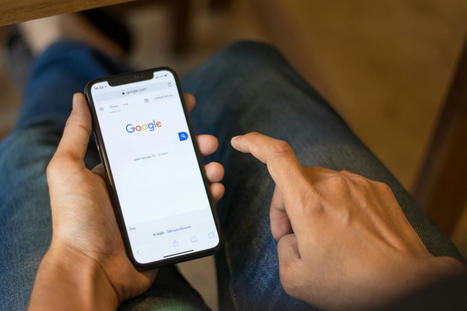



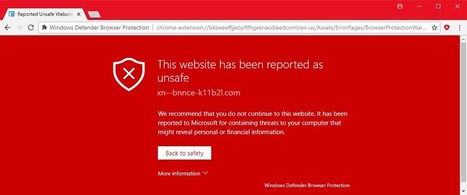
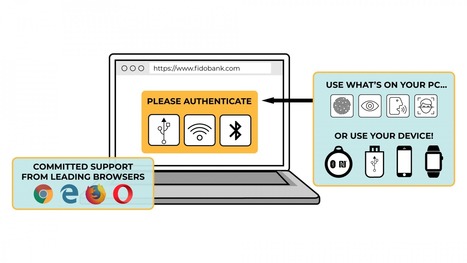



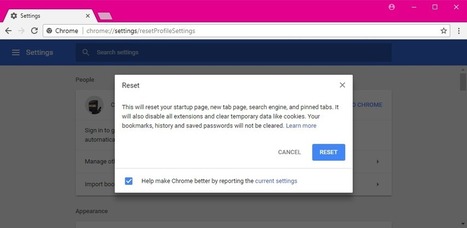
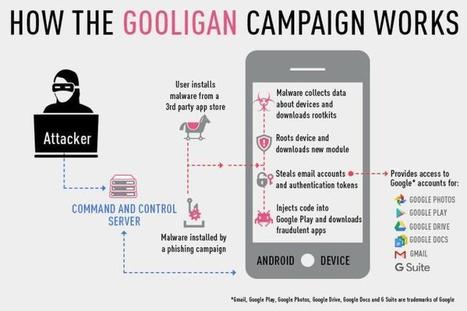

















Hackers have found a way to gain unauthorized access to Google accounts, bypassing any multi-factor authentication (MFA) the user may have set up. To do this they steal authentication cookies and then extend their lifespan. It doesn’t even help if the owner of the account changes their password.
Since the discovery of the exploit, numerous white and black hat security researchers have looked into and discussed the issue. As a result, the exploit is now built into various information stealers.
Learn more / En savoir plus / Mehr erfahren:
https://www.scoop.it/t/securite-pc-et-internet/?&tag=Two-factor+authentication
https://www.scoop.it/topic/securite-pc-et-internet/?&tag=2FA
https://www.scoop.it/t/securite-pc-et-internet/?&tag=DATA-BREACHES
https://www.scoop.it/topic/securite-pc-et-internet/?&tag=MFA